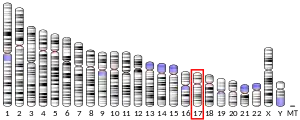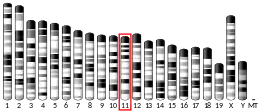ABCA9
ATP-binding cassette sub-family A member 9 is a protein that in humans is encoded by the ABCA9 gene.[5]
| ABCA9 | |||||||||||||||||||||||||||||||||||||||||||||||||||
|---|---|---|---|---|---|---|---|---|---|---|---|---|---|---|---|---|---|---|---|---|---|---|---|---|---|---|---|---|---|---|---|---|---|---|---|---|---|---|---|---|---|---|---|---|---|---|---|---|---|---|---|
| Identifiers | |||||||||||||||||||||||||||||||||||||||||||||||||||
| Aliases | ABCA9, EST640918, ATP binding cassette subfamily A member 9 | ||||||||||||||||||||||||||||||||||||||||||||||||||
| External IDs | OMIM: 612507 MGI: 2386796 HomoloGene: 33332 GeneCards: ABCA9 | ||||||||||||||||||||||||||||||||||||||||||||||||||
| |||||||||||||||||||||||||||||||||||||||||||||||||||
| |||||||||||||||||||||||||||||||||||||||||||||||||||
| |||||||||||||||||||||||||||||||||||||||||||||||||||
| |||||||||||||||||||||||||||||||||||||||||||||||||||
| |||||||||||||||||||||||||||||||||||||||||||||||||||
| Wikidata | |||||||||||||||||||||||||||||||||||||||||||||||||||
| |||||||||||||||||||||||||||||||||||||||||||||||||||
Function
This gene is a member of the superfamily of ATP-binding cassette (ABC) transporters and the encoded protein contains two transmembrane domains and two nucleotide binding folds. ABC proteins transport various molecules across extra- and intracellular membranes. ABC genes are divided into seven distinct subfamilies ( ABC1, MDR/TAP, MRP, ALD, OABP, GCN20, and White). This gene is a member of the ABC1 subfamily and is clustered with four other ABC1 family members on chromosome 17q24. Transcriptional expression of this gene is induced during monocyte differentiation into macrophages and is suppressed by cholesterol import.[5]
References
- GRCh38: Ensembl release 89: ENSG00000154258 - Ensembl, May 2017
- GRCm38: Ensembl release 89: ENSMUSG00000041797 - Ensembl, May 2017
- "Human PubMed Reference:". National Center for Biotechnology Information, U.S. National Library of Medicine.
- "Mouse PubMed Reference:". National Center for Biotechnology Information, U.S. National Library of Medicine.
- "Entrez Gene: ABCA9 ATP-binding cassette, sub-family A (ABC1), member 9".
Further reading
- Dean M, Rzhetsky A, Allikmets R (2001). "The human ATP-binding cassette (ABC) transporter superfamily". Genome Res. 11 (7): 1156–66. doi:10.1101/gr.184901. PMID 11435397. S2CID 9528197.
- Gerhard DS, Wagner L, Feingold EA, et al. (2004). "The status, quality, and expansion of the NIH full-length cDNA project: the Mammalian Gene Collection (MGC)". Genome Res. 14 (10B): 2121–7. doi:10.1101/gr.2596504. PMC 528928. PMID 15489334.
- Ota T, Suzuki Y, Nishikawa T, et al. (2004). "Complete sequencing and characterization of 21,243 full-length human cDNAs". Nat. Genet. 36 (1): 40–5. doi:10.1038/ng1285. PMID 14702039. S2CID 21903526.
- Mammalian Gene Collection Program Team; Strausberg, R. L.; Feingold, E. A.; Grouse, L. H.; et al. (2002). "Generation and initial analysis of more than 15,000 full-length human and mouse cDNA sequences". Proceedings of the National Academy of Sciences. 99 (26): 16899–16903. Bibcode:2002PNAS...9916899M. doi:10.1073/pnas.242603899. PMC 139241. PMID 12477932.
- Piehler A, Kaminski WE, Wenzel JJ, et al. (2002). "Molecular structure of a novel cholesterol-responsive A subclass ABC transporter, ABCA9" (PDF). Biochem. Biophys. Res. Commun. 295 (2): 408–16. doi:10.1016/S0006-291X(02)00659-9. PMID 12150964.
- Allikmets R, Gerrard B, Hutchinson A, Dean M (1997). "Characterization of the human ABC superfamily: isolation and mapping of 21 new genes using the expressed sequence tags database". Hum. Mol. Genet. 5 (10): 1649–55. doi:10.1093/hmg/5.10.1649. PMID 8894702.
- Hillier LD, Lennon G, Becker M, et al. (1997). "Generation and analysis of 280,000 human expressed sequence tags". Genome Res. 6 (9): 807–28. doi:10.1101/gr.6.9.807. PMID 8889549.
External links
- ABCA9 human gene location in the UCSC Genome Browser.
- ABCA9 human gene details in the UCSC Genome Browser.
This article is issued from Wikipedia. The text is licensed under Creative Commons - Attribution - Sharealike. Additional terms may apply for the media files.



